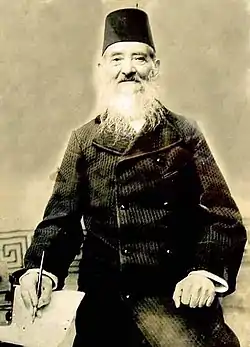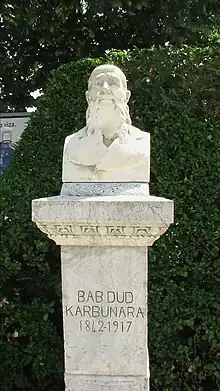Babë Dud Karbunara | |
|---|---|
 | |
| Born | Jorgji Karbunara 22 April 1842 |
| Died | 19 December 1917 (aged 75) Berat, Albania |
| Nationality | Albanian |
Babë Dud Karbunara (22 April 1842 – 19 December 1917), born Jorgji Karbunara was an Albanian teacher and politician. He was one of the signatories of the Albanian Declaration of Independence.[1]
Early life
His grandfather had moved from Trozhar near Tërpan to Berat, where his son Theodhor later worked as a gold work embroiderer. Babë Dud Karbunara, son of Theodhor, was born as Jorgji Karbunara on April 22, 1842, in the Kala neighborhood of Berat.[2] He initially studied in Corfu and later continued his studies in Trieste.[3]
Career
During the League of Prizren era he started an emigre branch of the organization in Corfu.[4] Karbunara's activism primarily focused on the opening of Albanian-language schools in his native region, Berat.[4] Karbunara's activity as a teacher of Albanian was banned in the 1890s and it led to his house being burnt by Ottoman agents on September 14, 1894.[2] After the establishment of the 1908 constitution, along with other Rilindas of the city, he opened two Albanian-language schools in Berat.[3] During the Albanian Revolt of 1912 he organized the assembly of Sinjë, where the rebel bands of southern Albania signed the memorandum of Sinjë, a list of demands regarding Albanian rights in the Ottoman state.[3]

In November 1912, he participated as a delegate and signatory of Berat in the Assembly of Vlorë, in which the independence of Albania was declared and a national congress was formed. The deputies of the national congress also elected eighteen delegates of the assembly to form the Albanian Senate, of which Ajdin Draga was a member as a senator of Berat.[5]
On June 30, 1914, he was attacked by pro-Ottoman Islamic rebels led by Essadist Musa Qazimi. He was brutally beaten after being questioned "Are you Albanian or Osman (Ottoman)?", and after answering "Albanian, just like you are".[2]
Death
He died on December 19, 1917, and was buried in the cemetery of St. George's church of the city. The ceremony was held in Mangalem neighborhood church, with a huge participation of the town's population.[2] Vatra's musical band came from Boston to pay respect to him at his grave.
Honours
In 1937, a bust of Karbunara by sculptor Dhimitër Çani was presented in Berat, while during the Communist era he was posthumously awarded the Mësues i Popullit (English: Teacher of the People) medal.[2][3] Today, a high school in Berat keeps the name "Babë Dud Karbunara" in his honour.
References
- ↑ "History of Albanian People" Albanian Academy of Science.ISBN 99927-1-623-1
- 1 2 3 4 5 Kraja, Abedin (2012). "Babë Dudë Karbunara, si u masakrua para popullit firmëtari i Pavarësisë". Gazeta Shqiptare Online(Balkanweb) (in Albanian). Archived from the original on 4 February 2014. Retrieved 13 October 2012.
- 1 2 3 4 Papa, Viktor. "Bab Dudë Karbunara, simbol krenarie i qytetit të Beratit". Telegraf (in Albanian). Archived from the original on 18 October 2012. Retrieved 13 October 2012.
- 1 2 Kotherja, Niko (December 1, 2010). "Firmëtarët e aktit të pavarësisë". Shqip (in Albanian). Archived from the original on 4 January 2011. Retrieved 13 October 2012.
- ↑ Schmidt-Neke, Michael (1987). Enstehung und Ausbau der Königsdiktatur in Albanien, 1912–1939 (in German). Oldenbourg Verlag. pp. 320–1. ISBN 9783486543216. Retrieved 13 October 2012.